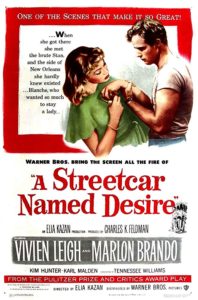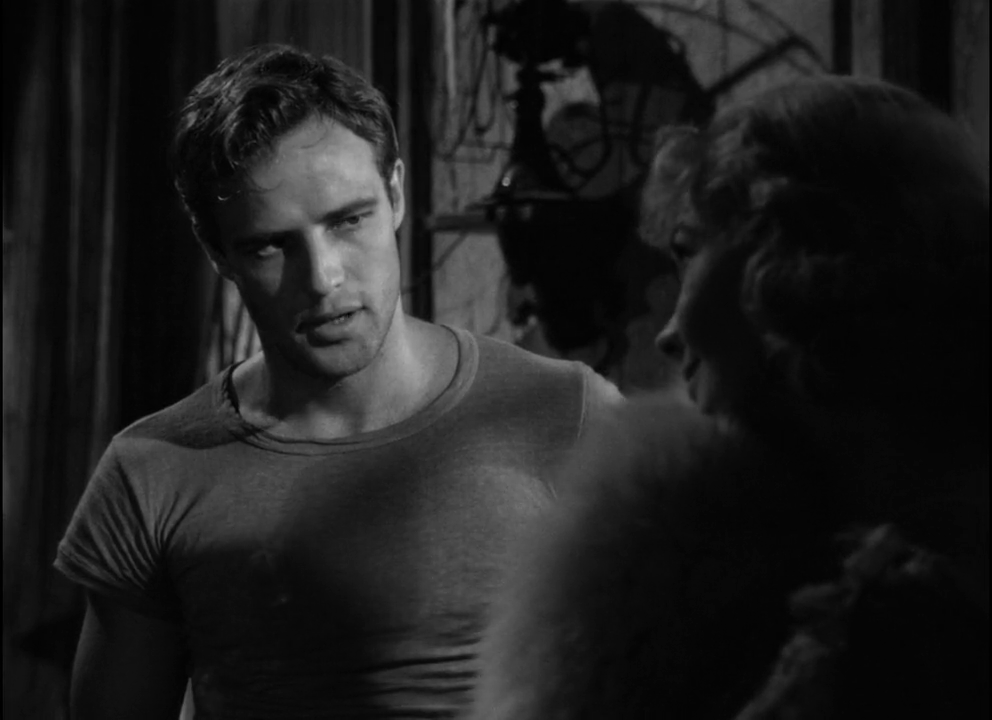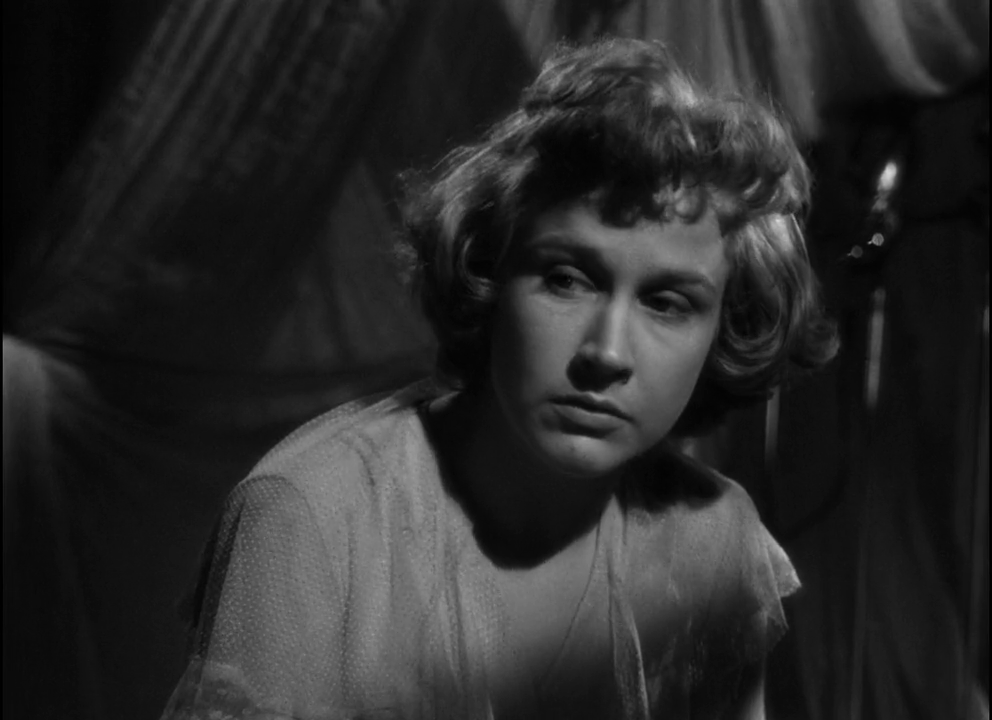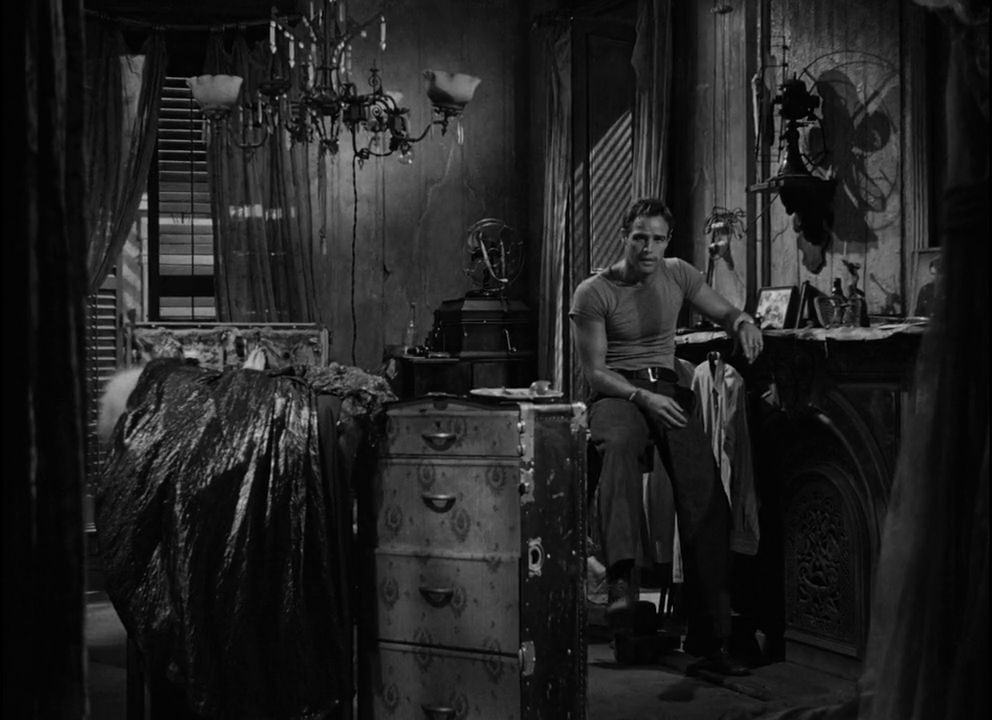Streetcar Named Desire, A (1951)
“Deliberate cruelty is not forgivable! It is the one unforgivable thing, in my opinion, and the one thing of which I have never, never been guilty.”
|
Synopsis: |
|
Genres, Themes, Actors, and Directors:
Response to Peary’s Review: In Alternate Oscars, Peary agrees with the Academy’s choice of Leigh as Best Actress of the Year, noting, “Those of us who see the optimistic twenty-six-year-old Leigh in Scarlett [from Gone With the Wind] surely see in Blanche the older Leigh who suffered from depression and experienced mental breakdowns”. Indeed, there’s “no doubt her own condition helped her sympathize with Blanche — at times it seems like she is exorcising her own demons.” He spends considerable time discussing how Blanche is “on her last legs” since “she has lost her youth” and “has no prospects”, and points out that the “part is difficult because Blanche has no foundation, no key that can be turned to put her back into the correct mode of motion and speech” — “not anymore”, given that “everything solid has been clawed out of her.” Only during a brief, “seemingly minor scene in which Blanche flirts with a young man who is collecting for the newspaper” does she “regain her power” and “shine” — at which point she is “wistful, poetic, haunting, alluring, and both amoral… and moral”. Leigh’s performance is undeniably the centerpiece of this devastating film (one I find both challenging and mesmerizing to watch), but there is much more to make note of as well. Brando’s screen presence is a visceral gut-punch of brutality; while we completely understand Hunter’s physical attraction to him — and it makes sobering sense that she would put up with his domestic violence, given the warped nature of such enmeshments — it’s less easy to understand how she deals with his “subhuman” personality. Regardless, such is love and lust — and Hunter masterfully embodies her complex character in a way that allows us to stick with and believe in this aspect of the story. Also notable is the highly atmospheric cinematography by Harry Stradling, who sharply highlights nearly every scene in black-and-white contrast, showcasing the many extremes at play in this toxic swirl of a muggy landscape. Meanwhile, Alex North’s score is haunting, percussive, lyrical, and mystical — the perfect background to a gothic tale of madness. Redeeming Qualities and Moments:
Must See? Categories
(Listed in 1001 Movies You Must See Before You Die) Links: |








One thought on “Streetcar Named Desire, A (1951)”
A no-brainer must-see – as one of the best films of the ’50s. It is noteworthy for every single aspect that goes into it. It is simply brilliant filmmaking and it holds up well on repeat viewings (which can also be rich experiences). As per my post in ‘The ’40s-’50s in Film’ (fb):
“I loved someone once – and the person I loved, I lost.”
‘A Streetcar Named Desire’ (1951): In 1994, Elia Kazan’s film of Tennessee Williams’ play was given a new theatrical release (it had already been re-issued successfully in 1958) – but, this time, it was finally shown with all of the cuts previously made in order to please both the Hays Office and the Legion of Decency. (After a search, the cuts had been found – in unmarked cans.) A number of the cuts or changes had been either confusing or laughable. (In the terrific DVD extra, ‘Desire and Censorship’, Kim Hunter recalls such a cut, re: homosexuality. There was to be no direct reference to it in one of Vivien Leigh’s speeches – but the way the speech was altered led Leigh to respond in disbelief, “Wait a minute. My husband kills himself because he’s – a poet?”) …I rewatched the film this time with the intent to focus mainly on Leigh. I’m sure many people think her Blanche just goes crazy at the end. But perhaps others have noticed that, from the moment we first see her, as she manages to ‘walk through the fog’ (the train steam), Blanche is already only a few steps from lunacy. Believing that her last hope – her only living relative – will offer her a safe haven from her recent history of abandonment, pain and death, her increasingly fragile sense of self begins to crumble when she sees where her sister lives. During the bulk of the film, Blanche keeps up the fight of holding on to hope (after all, she still has Stella) – but ultimately the film seems to be about those who realize certain crucial realities of life much too late… and are left unprepared to negotiate with it. …But, of course, the film is infinitely more complex (though straightforward) than what we see in Blanche. It also, occasionally, has offhanded humor:
Stella: Stanley was born just five minutes after Christmas!
Blanche: Capricorn! The goat!